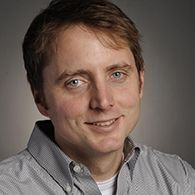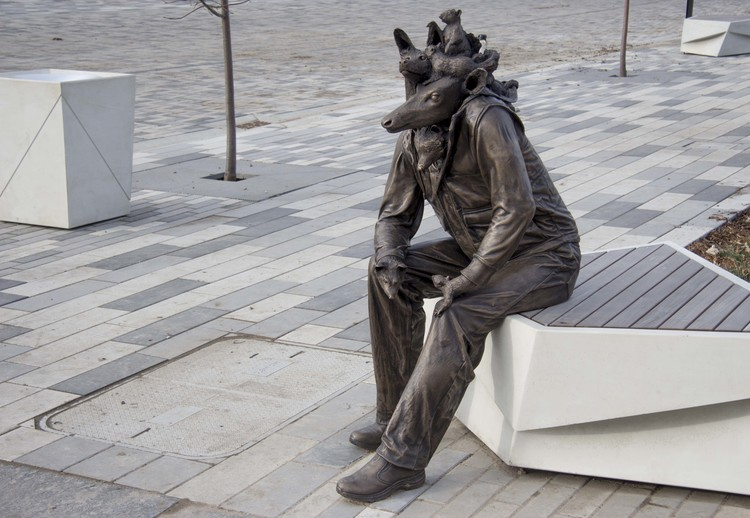TORONTO, Wednesday, May 10, 2017 – Public art can startle, resonate and inform, but its role is changing as expectations evolve about what it should be and do. York University’s Department of Visual Art & Art History will host a symposium May 18 to 20 with a focus on the policies and practices of commissioning and creating art for the public realm.
Public Art: New Ways of Thinking and Working will bring together artists, curators, urban planners, academics, policymakers and community organizers to explore the changing role of public art. Talks and panels are designed to spark conversations across disciplines, from the perspective of both research and practice, about the current state of contemporary Canadian public art practice in the context of innovations happening internationally.

Sculptor Brandon Vickerd, chair of the Department of Visual Art and Art History in York’s School of the Arts, Media, Performance & Design
The symposium is co-organized by sculptor Brandon Vickerd, chair of the Department of Visual Art & Art History in York’s School of the Arts, Media, Performance & Design, and Ciara McKeown, a Calgary-based public art consultant and commissioner. McKeown has served as advisor to the Creative City Network of Canada, and currently works as a project manager with artists Sans façon.
Vickerd’s large-scale public art projects include Wildlife, hybrid human/animal figures commissioned for streetscapes in Edmonton and Thunder Bay, and Dance of the Cranes, a collaborative, choreographed work performed by high-rise construction cranes perched atop buildings, that has engaged developers and crane operators and enthralled residents in Toronto, Edmonton and Washington D.C.
“Public art is contentious. It straddles expectations ranging from traditional to temporary, monument to site, community-based to corporate,” said Vickerd. “The increasingly diverse, connected and yet fractious world we live in raises important questions about the role of public art and its relationship to issues such as economic disparity, environmental uncertainty, cultural inclusivity and political unrest.”

"Wildlife" by sculptor Brandon Vickerd, chair of the Department of Visual Art and Art History in York’s School of the Arts, Media, Performance & Design
He noted that the symposium comes at a pivotal moment as ideas of what public art can and should be are being revisited by both creators and commissioners across Canada.
“Most Canadian municipal public art policies were established decades ago. Since that time, artists have dramatically re-positioned their approach to public art. And so has the public. Audience engagement is key,” said Vickerd.
“Our symposium takes an inclusive approach to exploring current issues and innovations, with the aim of expanding the conversation about public art in Canada and creating tangible outcomes. We look forward to lively debate and open dialogue on how to advance critical, social and civic discourse through public art, the shifting roles and expectations of artists, and what the future holds for public art practice.
WHAT: Public Art: New Ways of Thinking and Working, a symposium featuring two keynote talks and 12 panel discussions on topics ranging from the role of artists in city-building and of public art as social engagement, to the political and cultural role of commemorative monumental sculptures, public space and Indigenous political expression, Canadian public art in China, and artistic dissension as community practice.
- Free public talk, “When Aesthetics is Not Enough,” by American artist Steve Kurtz, founding member of the internationally acclaimed Critical Art Ensemble, co-presented by the Art Gallery of Ontario, will look at the challenges of producing art in the public sphere that moves beyond decoration on Thursday, May 18 at 7pm at the AGO.
- Keynote address, “Permanent Works in an Impermanent Time,” by Emily Carr University of Art & Design Associate Professor Cameron Cartiere, a practitioner and researcher specializing in public art, community engagement and urban renewal, will address problems of standard practices in municipal commissioning processes for public art on Friday, May 19 at 4:30pm at York U.
WHEN: Thursday, May 18 to Saturday, May 20.
WHERE: Kurtz’ talk is in the AGO’s Jackman Hall. All other events are in the Accolade West Building, at York University, 4700 Keele St. (See number 93 on the map.)
REGISTRATION: The symposium is open to the public. Symposium pass is $125 and $75 for students/artists/underemployed. Register online.
Public Art: New Ways of Thinking and Working is a York University Canada 150 project.
PHOTOS:
- Brandon Vickerd, Steve Kurtz (photo by kc kratt) and Cameron Cartiere
- A Temporary monument to North American Energy Security, Nuit Blanche, 2014 (Source: http://critical-art.net/?cat=3)
- Wildlife (Source: http://brandonvickerd.com/index/#/wildlife/)
- Wildlife (2) (Source: http://brandonvickerd.com/index/#/wildlife-2/)
- Silent Fairground (Source: https://www.sansfacon.org/)
-30-
York University is known for championing new ways of thinking that drive teaching and research excellence. Our students receive the education they need to create big ideas that make an impact on the world. Meaningful and sometimes unexpected careers result from cross-discipline programming, innovative course design and diverse experiential learning opportunities. York students and graduates push limits, achieve goals and find solutions to the world’s most pressing social challenges, empowered by a strong community that opens minds. York U is an internationally recognized research university – our 11 faculties and 26 research centres have partnerships with 200+ leading universities worldwide. Located in Toronto, York is the third largest university in Canada, with a strong community of 53,000 students, 7,000 faculty and administrative staff, and more than 295,000 alumni. York U's fully bilingual Glendon campus is home to Southern Ontario's Centre of Excellence for French Language and Bilingual Postsecondary Education.
Media Contact:
Sandra McLean, York University Media Relations, 416-736-2100 ext. 2097, sandramc@yorku.ca

